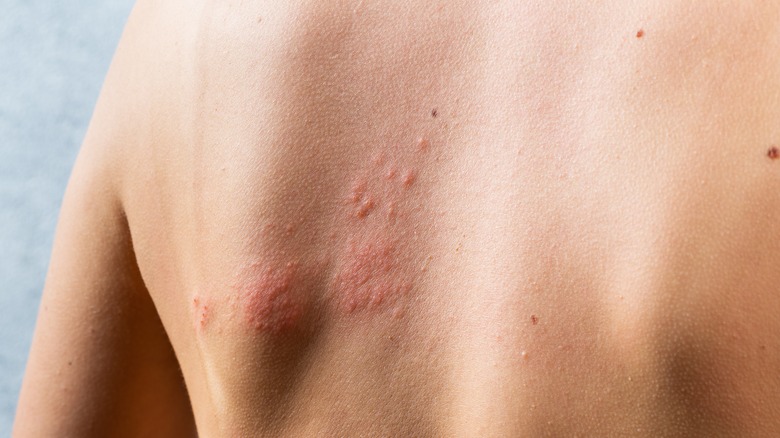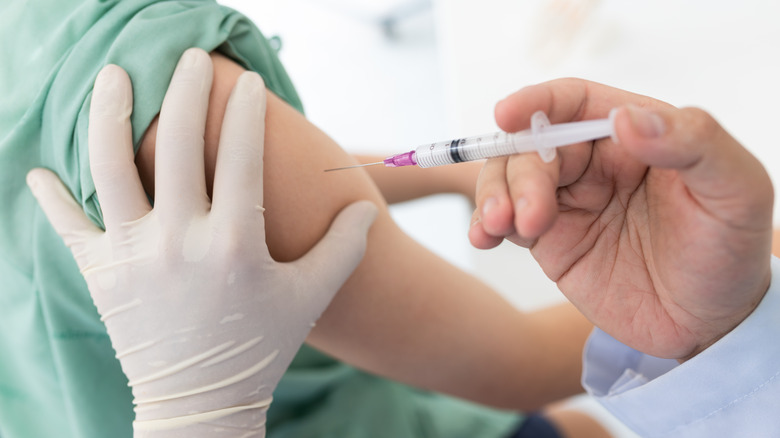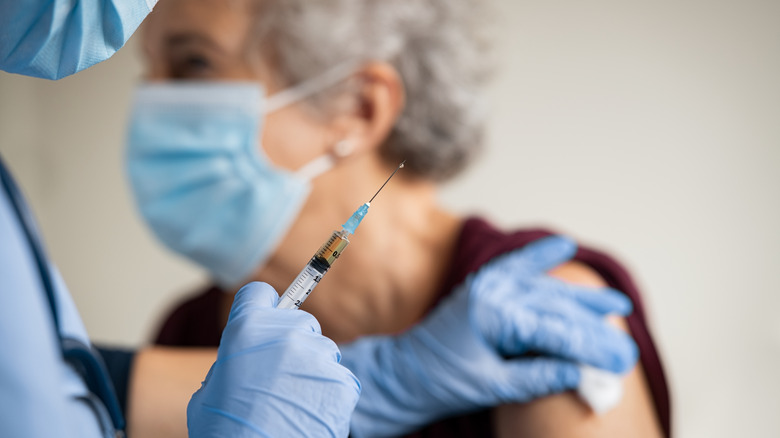Vaccines That All Adults Over 65 Should Get
Vaccines are preparations that give you immunity to a specific disease. According to Centricity Research, vaccines are usually made from a weakened or inactivated form of the microbe that causes the disease, or a piece of the microbe's genetic material.
When a vaccine is administered, it stimulates a person's immune system to recognize and fight the microbe if the person is later exposed to it without causing the person to become sick with the disease — this is known as "immunization" (via the Pan American Health Organization).
Vaccines are one of the most effective ways to prevent the spread of infectious diseases and have greatly reduced the incidence of many deadly diseases throughout history. They are particularly important for older adults as they are at a higher risk of severe illness and death from many infectious diseases like flu and pneumonia.
The immune system naturally weakens with age, making older adults more susceptible to infections and less able to fight off disease (via the U.S. Department of Health and Human Sciences). Vaccines can also help older adults maintain their independence and ability to function and avoid hospitalization.
Flu vaccine
The flu, which is caused by influenza viruses, is a highly contagious respiratory illness that can cause mild to severe symptoms, per Healthline. According to Yale University, 90% of influenza A deaths worldwide affect people over the age of 65. The influenza vaccine, also known as the flu shot, is a vaccine that helps protect against the flu, per the Centers for Disease Control and Prevention (CDC).
It is recommended for everyone over the age of 6 months, especially those at high risk of serious flu complications, such as young children, pregnant women, people with certain chronic health conditions, and people 65 years and older, notes Healthline. According to the CDC, the flu vaccine is usually given as an injection.
The vaccine is formulated each year to protect against the strains of influenza that are expected to circulate the most during the upcoming flu season, per the Mayo Clinic. So it's important to get a flu shot each year, as the immunity provided by the vaccine decreases over time, and the strains of influenza that circulate can also change from year to year, explains the clinic. The body typically takes about 10-14 days after vaccination to develop immunity, according to the U.K. National Health Service (NHS).
Pneumococcal vaccine
According to the Mayo Clinic, pneumonia is an infection that affects the lungs and can be caused by various bacteria (such as Streptococcus pneumoniae), viruses, and fungi. Pneumonia is a serious condition that can lead to hospitalization and even death, particularly in older adults, young children, and people with weakened immune systems, explains the clinic.
To prevent pneumococcal disease caused by Streptococcus pneumoniae bacteria, vaccines are available. The vaccine is recommended for certain people who are at increased risk, such as people with certain health conditions and older adults.
According to the CDC, there are two types of pneumococcal vaccines available: the pneumococcal conjugate vaccine (PCV13, PCV15, and PCV20) and the pneumococcal polysaccharide vaccine (PPSV23). The PCV15 and PCV20 vaccines are recommended for adults over 65 years old. PCV15 is usually followed with a dose of the PPSV23 vaccine, explains the CDC.
It's important to note that the pneumococcal vaccine will not protect against all types of pneumonia, per WebMD. Therefore, it is important to practice good hygiene and to take other measures to reduce the risk of infection, such as getting a flu shot (since flu can lead to pneumonia), washing your hands frequently, avoiding close contact with people who are sick, and staying home if you are feeling sick.
The shingles vaccine
According to Healthline, shingles or herpes zoster, is a viral infection that causes a painful rash. The virus responsible for shingles is the varicella-zoster virus, responsible for chickenpox. After a person has had chickenpox, the virus can remain dormant in the body and later reactivate as shingles.
The shingles vaccine is recommended for people aged 50 and older, regardless of whether they have had shingles in the past (via the Mayo Clinic). According to the clinic, the vaccine is given in 2 doses within 2-6 months of each other, and can help prevent shingles.
The shingles vaccine is about 90% effective, and it is generally well-tolerated — serious side effects are rare, says Healthline. It's important to note that the shingles vaccine will not protect everyone who receives it from getting shingles, but it can help reduce the duration and severity of symptoms if you do get shingles.
The Tdap vaccine
The Tdap vaccine is a combination vaccine that protects against three serious bacterial infections: tetanus, diphtheria, and pertussis (whooping cough), per WebMD.
According to the source, tetanus is a serious infection that affects the nervous system and can cause severe muscle stiffness and spasms. Diphtheria is also serious but typically affects the nose and throat. It can cause breathing difficulties and damage to the heart and nervous system. Lastly, pertussis, also known as whooping cough, is a highly contagious respiratory illness that causes severe coughing and difficulty breathing and can lead to hospitalization, particularly in infants, per WebMD.
The Tdap vaccine is recommended for all individuals over the age of 11 — especially people who are pregnant or in close contact with infants. The vaccine is given as a single shot. It is usually given in the arm, and the schedule varies depending on the country. In the United States, a booster is recommended every 10 years.
The Tdap vaccine is safe, and it is effective at preventing tetanus, diphtheria, and pertussis. It also helps to reduce the spread of these infections to others, particularly young children who are at a higher risk of severe complications from pertussis. According to the CDC, the Advisory Committee on Immunization Practices recommends adults age 65 and older get the Tdap vaccine.
COVID-19 vaccines
COVID-19 vaccines are a key tool in the fight against the COVID-19 pandemic caused by the SARS-CoV-2 virus. Currently, several COVID-19 vaccines have been authorized for emergency use by regulatory agencies around the world, including Pfizer-BioNTech, Moderna, and Johnson & Johnson, per the CDC.
It's important to note that some people who have been vaccinated may still get infected with the virus. However, the vaccines are highly effective at preventing severe illness and death caused by the virus.
The COVID-19 vaccine is generally recommended for everyone aged 18 and older, especially for certain groups of people at increased risk of severe illness or death from COVID-19, such as older adults and people with underlying health conditions. The schedule and dosage vary depending on the vaccine.
While further research and monitoring are needed to understand the impact of COVID-19 variants on the vaccines, the CDC reports that COVID-19 vaccines continue to protect against severe illness and death.
Be sure to consult with your doctor to ensure that you're up-to-date on all of the vaccines that they recommend for you.






